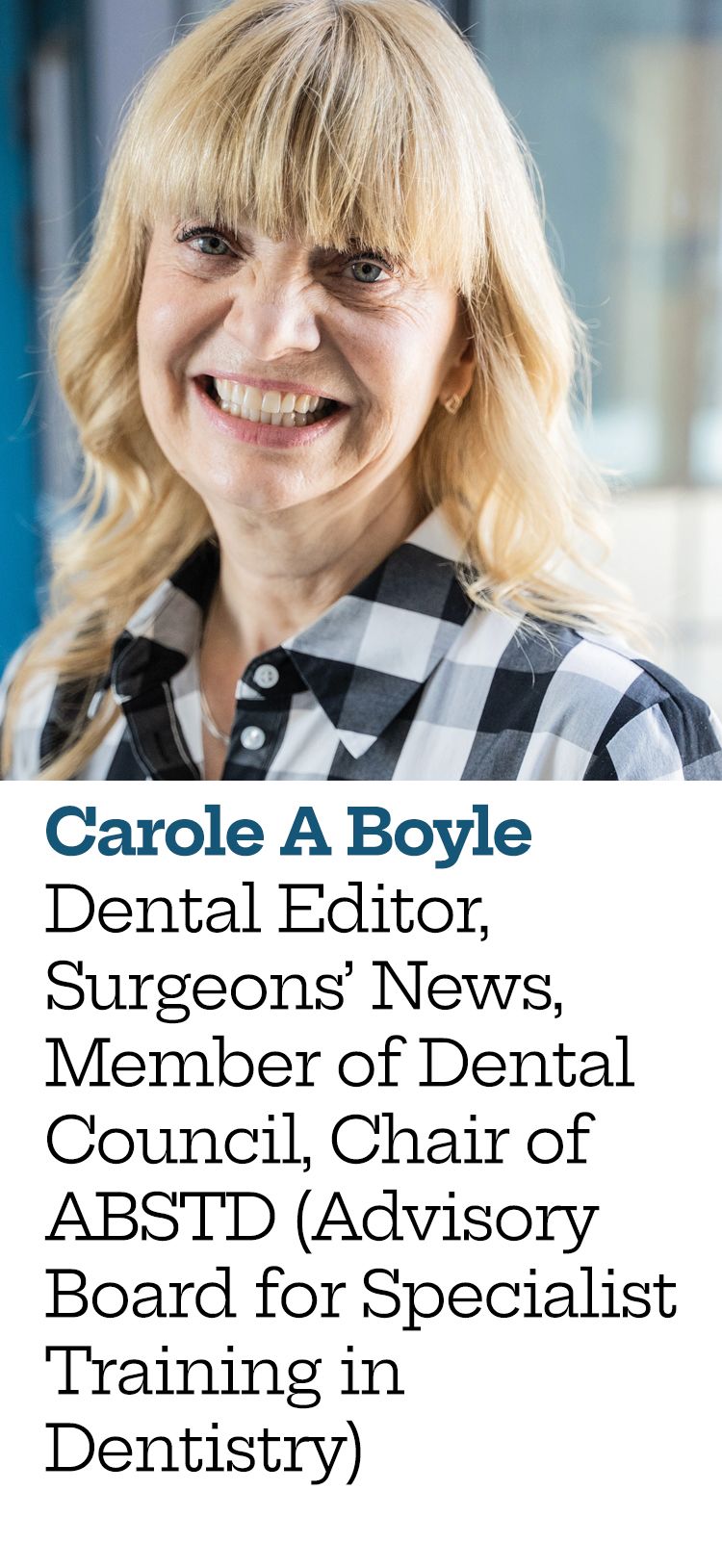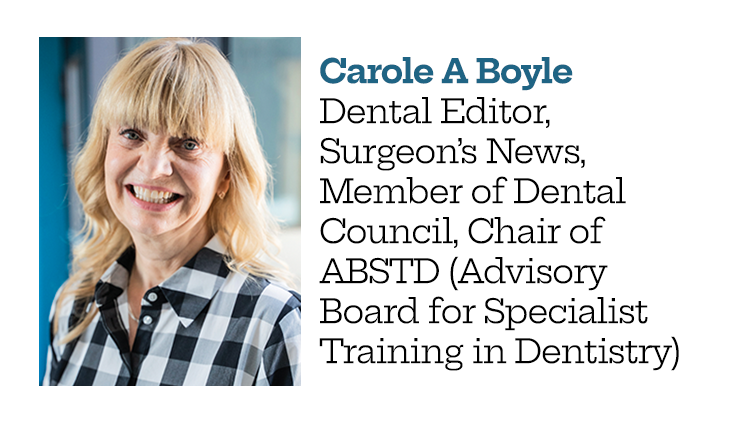Aiming high
is key (COPY) (COPY) (COPY)
Grant McIntyre explores the new vision for dental specialty exams
Revamping the curricula
From this year dental trainees will undergo entirely new programmes, but how was this training designed?
From September all dental specialty trainees will follow revised curricula, accompanied by revised formative and summative assessments, but it’s important to reflect on the huge amount of work undertaken by many people to reach this stage.
Revision of the curricula started in 2017, which was long overdue as it had not been reviewed for some time – some areas as long ago as 2009. Manjula Das, Head of Education and Quality Assurance and the General Dental Council (GDC) Lead for Specialty Education and Training, describes the initial process: “There was no process to quality-assure the curricula, so the GDC decided in agreement with stakeholders that the revision of all 13 specialties would aim to ensure consistency in standards, so that a certificate of completion of specialty training would be equal between the different specialties.
“The process started when the GDC created the Standards for Specialty Education, against which the GDC benchmarked aspects of the curricula. This was developed with stakeholder input, including through the GDC’s Specialty Working Group, and involved a full public consultation. These standards were approved and published in December 2019. “As well as the revision of specialty curricula, the GDC also started quality-assuring the postgraduate deaneries and dental faculties of the royal colleges from 2020.”
Of course this timing was superseded by events, with the process slowing down when the pandemic took centre stage. It did mean that all those involved became proficient at online meetings and the use of Teams made communication quicker.
Perhaps one of the biggest changes is the establishment of a generic curriculum for each specialty: Section C. This was developed in conjunction with COPDEND (UK Committee of Postgraduate Dental Deans and Directors) and means all trainees have to reach the same standards across four domains: professional knowledge and management; leadership and teamworking; patient safety, quality improvement and governance;and personal education, training, research and scholarship.
James Spencer, Postgraduate Dental Dean and Lead Dean for Dental Specialty Training, says of Section C: “The introduction of a generic professional section is a major innovation. Historically, all trainees developed and demonstrated these qualities but now they will need to be formally evidenced. This will be new for both trainees and trainers and may present challenges. However, through collaboration with all stakeholders significant preparation has been undertaken, which will hopefully ensure the transition to the revised curricula is as uncomplicated as possible.”
The main method of assessing this part of the new curricula will be in the workplace and reviewed at the RCP (review of competency progression). Specialty-specific Part D sections of the curricula were developed by the SACs (Specialty Advisory Committees). Some had more work to do than others – the restorative committee had the three single specialties of endodontics, prosthodontics and periodontology, as well as restorative, to write.
The aim was to produce high-level outcomes that were then shared with stakeholders, including, where possible, patients and current/recent trainees. All 13 were approved early in 2023 and have been available on the GDC website since last March.
Roddy McMillan, Chair of the Oral Medicine SAC, recognises the contribution of trainees: “From the outset, we placed a heavy emphasis on specialty trainee input with regards to the curriculum review group. In fact, the oral medicine syllabus project was set up as an offshoot of the curriculum review and was led and independently administered by the oral medicine trainees.” The current Chair of the Oral Surgery SAC, Judith Jones, says of their curriculum: “This new oral surgery curriculum has been designed to reflect current clinical practice as well as future proofing for new developments. It also highlights appropriate personal and professional values and behaviours that would be expected of a specialist practitioner. It is hoped that it will be simpler for trainees and trainers to use as the confusing issue of extended competencies has been removed.”
Alex Keightley, Consultant in Paediatric Dentistry, reflects: “‘The most immediately notable change for those training in paediatric dentistry is the incorporation of the leadership and management training, now included in the generic component of all dental specialty curricula. Historically, much of this content sat in the Post-CCST curriculum. Given the leadership expectations of specialists in Paediatric Dentistry, this change will help the development of all those working in the specialty.” The updating of the curricula to include modern techniques is recognised by Brenda Murray, previous SAC Chair. She says: “The new curriculum encompasses the skills required of a modern day DMF (Dental and Maxillofacial) radiologist to interpret complex diseases and conditions of the head and neck, using a variety of imaging modalities including some, such as cone beam CT, that weren’t in common use when the previous iteration of the curriculum was produced. It also affirms the role of DMF radiologists in the provision of image-guided interventions to aid diagnoses and target treatments.”
Assessment is the last part of the process – for some specialties that are linked with medical royal colleges there will be little change. Oral and Maxillofacial Pathology, Dental and Maxillofacial Radiology and Oral Microbiology trainees will sit examinations set by their colleges. For other trainees the assessment will have the same broad format for all specialties with some subtle differences for Dental Public Health.
Grant McIntyre, RCSEd Dental Dean and previous Orthodontic SAC Chair, says: “It is right that summative assessments are reviewed alongside the introduction of the revised dental specialty curricula in the UK. Redesigning and extending the current approach of a single summative assessment for many of the dental specialties to all disciplines based on RCSEd and General Dental Council standards, and ensuring appropriate governance and financial arrangements, will strengthen the standards of UK training and, in doing so, improve patient care across dentistry.”
As this article goes to press, the details of the assessment are still being developed but the examinations will be at Fellowship level and involve all four UK and Irish surgical royal colleges working together. This quad collegiate working mirrors surgical counterparts across the 10 surgical specialties.
As Chair of the Advisory Board for Specialty Training in Dentistry and Member of Dental Council, I hope that trainees and their trainers will find the new curricula easier to use through their training journey and appreciate the areas where training has become
more equitable. The GDC plans to continue a programme of regular review of specialty curricula, so future revisions should be more effective and
efficient.

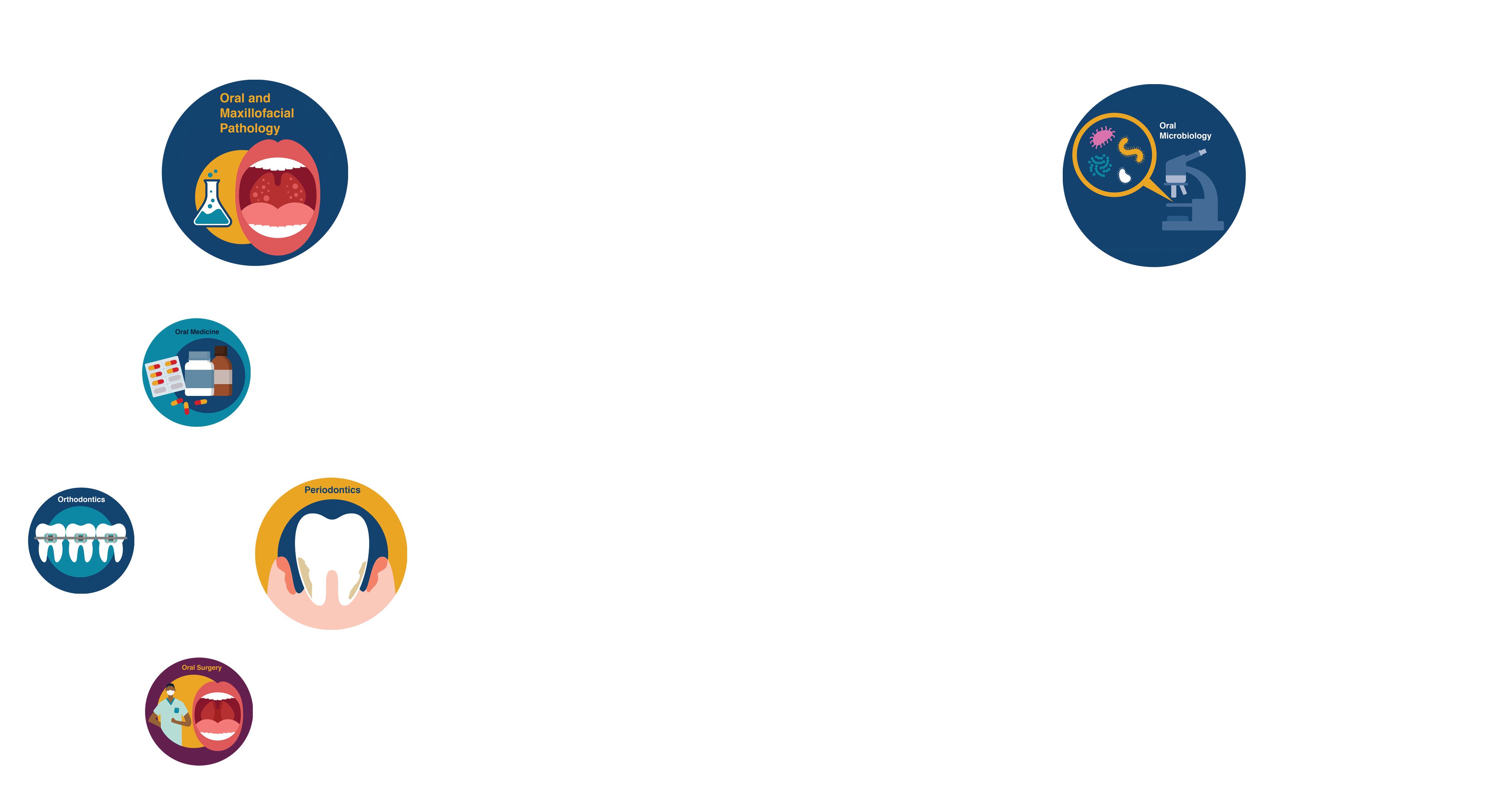
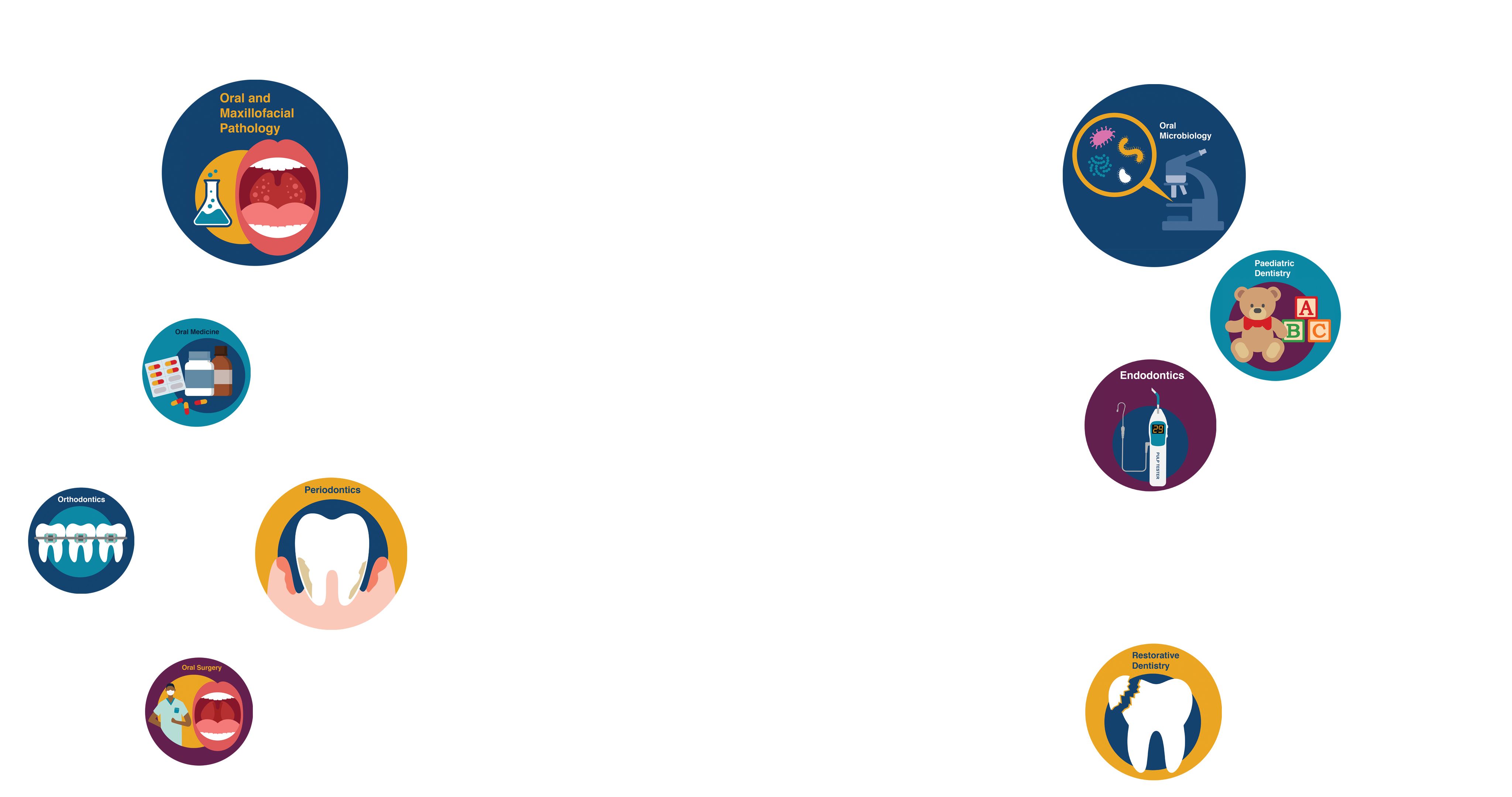
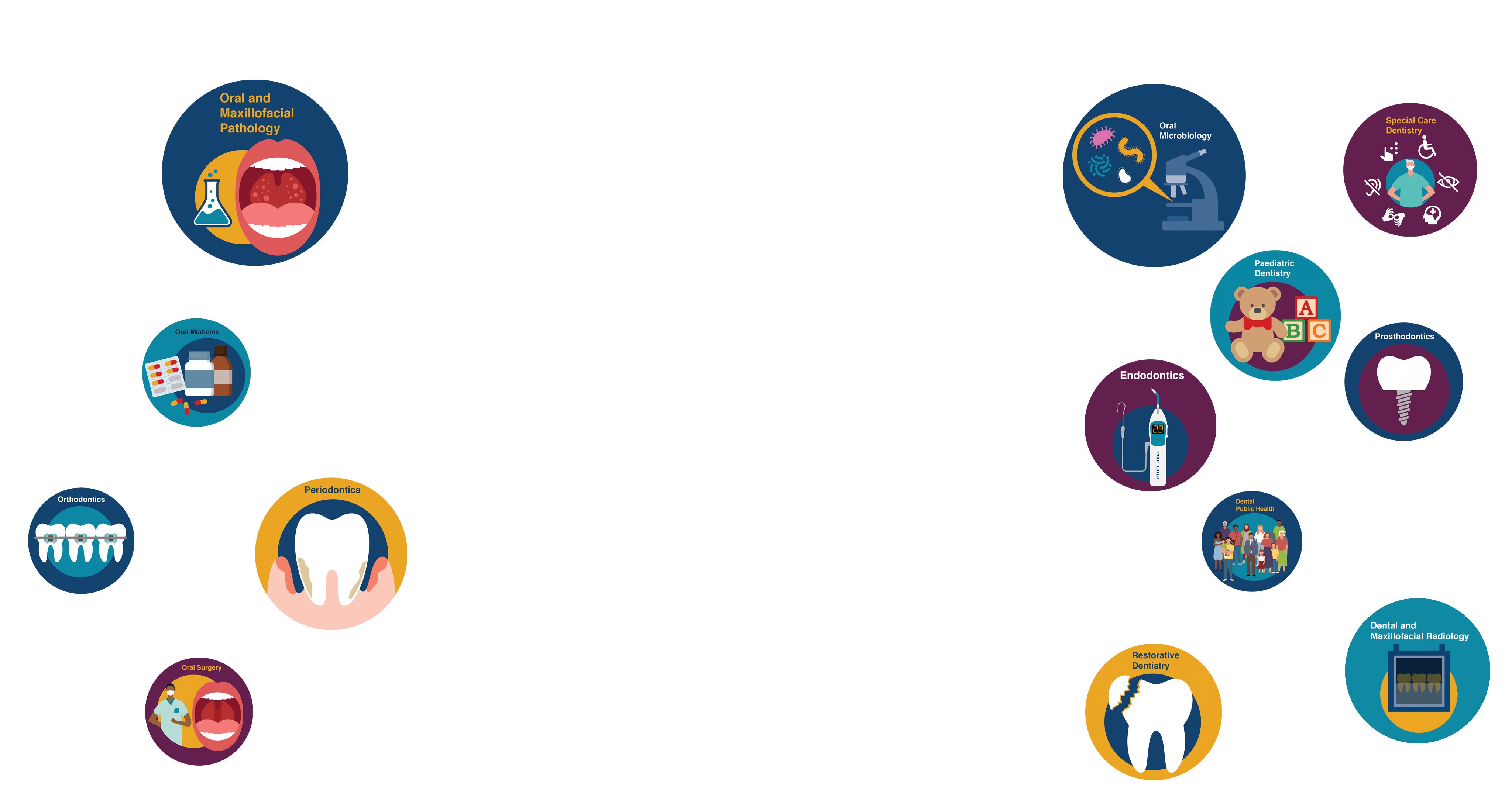
From September all dental specialty trainees will follow revised curricula, accompanied by revised formative and summative assessments, but it’s important to reflect on the huge amount of work undertaken by many people to reach this stage.
Revision of the curricula started in 2017, which was long overdue as it had not been reviewed for some time – some areas as long ago as 2009. Manjula Das, Head of Education and Quality Assurance and the General Dental Council (GDC) Lead for Specialty Education and Training, describes the initial process: “There was no process to quality-assure the curricula, so the GDC decided in agreement with stakeholders that the revision of all 13 specialties would aim to ensure consistency in standards, so that a certificate of completion of specialty training would be equal between the different specialties.
“The process started when the GDC created the Standards for Specialty Education, against which the GDC benchmarked aspects of the curricula. This was developed with stakeholder input, including through the GDC’s Specialty Working Group, and involved a full public consultation. These standards were approved and published in December 2019. “As well as the revision of specialty curricula, the GDC also started quality-assuring the postgraduate deaneries and dental faculties of the royal colleges from 2020.”
Of course this timing was superseded by events, with the process slowing down when the pandemic took centre stage. It did mean that all those involved became proficient at online meetings and the use of Teams made communication quicker.
Perhaps one of the biggest changes is the establishment of a generic curriculum for each specialty: Section C. This was developed in conjunction with COPDEND (UK Committee of Postgraduate Dental Deans and Directors) and means all trainees have to reach the same standards across four domains: professional knowledge and management; leadership and teamworking; patient safety, quality improvement and governance;and personal education, training, research and scholarship.
James Spencer, Postgraduate Dental Dean and Lead Dean for Dental Specialty Training, says of Section C: “The introduction of a generic professional section is a major innovation. Historically, all trainees developed and demonstrated these qualities but now they will need to be formally evidenced. This will be new for both trainees and trainers and may present challenges. However, through collaboration with all stakeholders significant preparation has been undertaken, which will hopefully ensure the transition to the revised curricula is as uncomplicated as possible.”
The main method of assessing this part of the new curricula will be in the workplace and reviewed at the RCP (review of competency progression). Specialty-specific Part D sections of the curricula were developed by the SACs (Specialty Advisory Committees). Some had more work to do than others – the restorative committee had the three single specialties of endodontics, prosthodontics and periodontology, as well as restorative, to write.
The aim was to produce high-level outcomes that were then shared with stakeholders, including, where possible, patients and current/recent trainees. All 13 were approved early in 2023 and have been available on the GDC website since last March.
Roddy McMillan, Chair of the Oral Medicine SAC, recognises the contribution of trainees: “From the outset, we placed a heavy emphasis on specialty trainee input with regards to the curriculum review group. In fact, the oral medicine syllabus project was set up as an offshoot of the curriculum review and was led and independently administered by the oral medicine trainees.” The current Chair of the Oral Surgery SAC, Judith Jones, says of their curriculum: “This new oral surgery curriculum has been designed to reflect current clinical practice as well as future proofing for new developments. It also highlights appropriate personal and professional values and behaviours that would be expected of a specialist practitioner. It is hoped that it will be simpler for trainees and trainers to use as the confusing issue of extended competencies has been removed.”
Alex Keightley, Consultant in Paediatric Dentistry, reflects: “‘The most immediately notable change for those training in paediatric dentistry is the incorporation of the leadership and management training, now included in the generic component of all dental specialty curricula. Historically, much of this content sat in the Post-CCST curriculum. Given the leadership expectations of specialists in Paediatric Dentistry, this change will help the development of all those working in the specialty.” The updating of the curricula to include modern techniques is recognised by Brenda Murray, previous SAC Chair. She says: “The new curriculum encompasses the skills required of a modern day DMF (Dental and Maxillofacial) radiologist to interpret complex diseases and conditions of the head and neck, using a variety of imaging modalities including some, such as cone beam CT, that weren’t in common use when the previous iteration of the curriculum was produced. It also affirms the role of DMF radiologists in the provision of image-guided interventions to aid diagnoses and target treatments.”
Assessment is the last part of the process – for some specialties that are linked with medical royal colleges there will be little change. Oral and Maxillofacial Pathology, Dental and Maxillofacial Radiology and Oral Microbiology trainees will sit examinations set by their colleges. For other trainees the assessment will have the same broad format for all specialties with some subtle differences for Dental Public Health.
Grant McIntyre, RCSEd Dental Dean and previous Orthodontic SAC Chair, says: “It is right that summative assessments are reviewed alongside the introduction of the revised dental specialty curricula in the UK. Redesigning and extending the current approach of a single summative assessment for many of the dental specialties to all disciplines based on RCSEd and General Dental Council standards, and ensuring appropriate governance and financial arrangements, will strengthen the standards of UK training and, in doing so, improve patient care across dentistry.”
As this article goes to press, the details of the assessment are still being developed but the examinations will be at Fellowship level and involve all four UK and Irish surgical royal colleges working together. This quad collegiate working mirrors surgical counterparts across the 10 surgical specialties.
As Chair of the Advisory Board for Specialty Training in Dentistry and Member of Dental Council, I hope that trainees and their trainers will find the new curricula easier to use through their training journey and appreciate the areas where training has become
more equitable. The GDC plans to continue a programme of regular review of specialty curricula, so future revisions should be more effective and
efficient.


